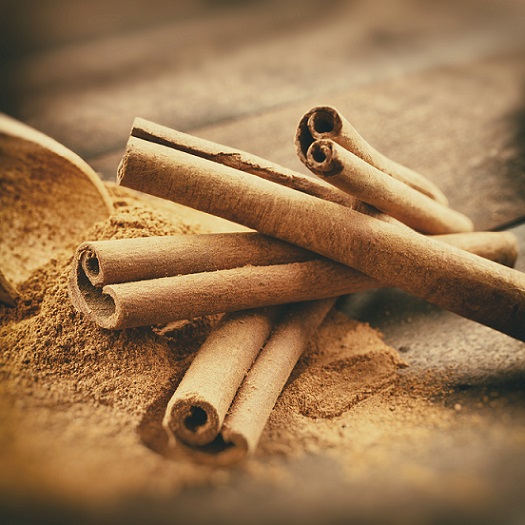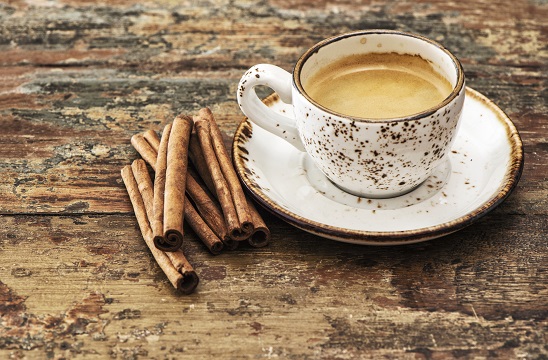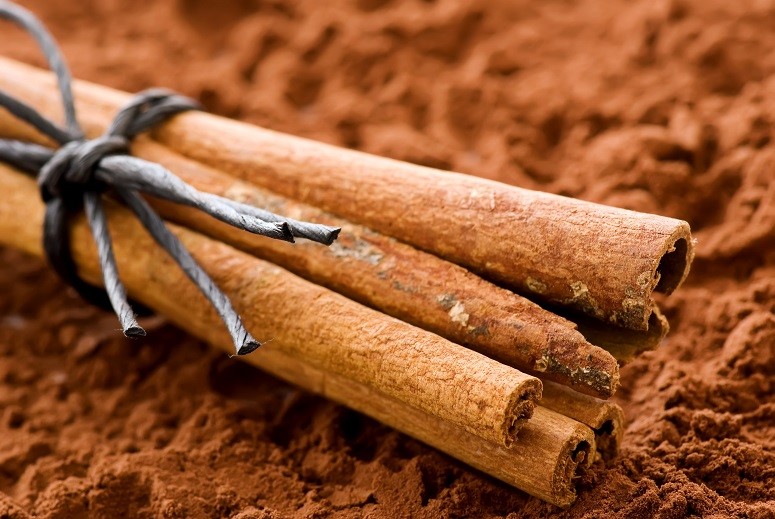 It’s not a well-known fact, but herbs and spices are among the most powerful acne-clearing foods in a grocery store. Packets of ginger, oregano, basil, and turmeric are often as cheap as sand, yet very few acne-clearing enthusiasts are taking advantage of them, and nothing illustrates this better than cinnamon.
It’s not a well-known fact, but herbs and spices are among the most powerful acne-clearing foods in a grocery store. Packets of ginger, oregano, basil, and turmeric are often as cheap as sand, yet very few acne-clearing enthusiasts are taking advantage of them, and nothing illustrates this better than cinnamon.
This spice is actually the bark of the cinnamon tree – an evergreen plant native to Sri Lanka that stands 32 to 49 feet tall. Its history is almost as ancient as garlic’s. Ancient Egyptians enjoyed the powder for spicing up their beverages, and used it in mummification. Cinnamon was first mentioned in journals of Chinese Botanic Medicine back in 2700BC.
For health, traditional Indian medicine (Ayurvedic medicine) recommends cinnamon bark for treating diabetes and improving digestion. In Chinese Traditional Medicine, cinnamon is prescribed for colds, nausea, and painful menstrual cramps. Interestingly, it was also given to people who felt hot in their upper body but had very cold feet.
We won’t beat about the bush in this article. Cinnamon is fantastic for acne, and it achieves this by lowering your blood sugar and insulin levels.
Lowered insulin = unblocked pores = less acne
We discussed insulin’s role in acne in this article, but if you’re new then here’s a recap. Whenever you eat a carbohydrate, whether it be starch or sugar, your blood glucose increases. In turn, this triggers a burst of insulin from your pancreas to covert this glucose into glycogen (energy) and shuttle it away for storage.
Insulin is a healthy hormone, but if you don’t expend that energy through exercise, your glycogen stores will become full. They make themselves less sensitive to insulin, and your blood glucose begins to increase. Your body compensates by pumping out more and more insulin. The cycle continues; the glycogen stores keep filling, and insulin resistance keeps growing.
The end result is a bloodstream with chronically elevated glucose and insulin. This condition is extremely common worldwide; insulin resistance is a form of pre-diabetes and 30 million Americans now have diabetes itself.
Read Annihilate Your Acne – get the ultimate diet and clear your acne permanently!
As for acne, it’s a recipe for clogged pores made in heaven. Glucose increases the turnover of dead skin cells, while insulin stimulates your sebaceous glands to produce more sebum (oil). Both are fine in moderation, but deadly for acne when elevated.
The main cause of extreme insulin resistance (and possibly acne full stop) is the high carbohydrate diet that nearly all governments have recommended since the 1970s. However, certain foods and acne nutrients like vitamin D can make your insulin receptors more sensitive independent of glycogen status. Overall, you need to…
ONE: directly lower both insulin and glucose levels in the blood.
TWO: lower the post prandial (post meal) spike of glucose and insulin.
THREE: increase the sensitivity of your insulin receptors/glycogen stores.
Cinnamon, a simple spice, seems to do all three…
Cinnamon effectively lowers oily skin and acne
In a study published in the December 2003 issue of Diabetes Care, scientists evaluated 60 patients with type 2 diabetes, 30 men and 30 women aged between 44 and 58 years. Groups 1, 2, and 3 were fed 1, 3, or 6 grams of cinnamon daily respectively, whereas groups 4, 5, and 6 received 1, 3 or 6 grams of a placebo.
After 40 days, all three quantities of cinnamon reduced triglycerides by 23-30%, LDL cholesterol by 7-27%, and total cholesterol by 12-26%…
…and what happened to blood glucose levels? They fell by 18-29%. Furthermore, the placebo group barely changed. Just one gram of cinnamon lowered glucose by 20%; that’s equivalent to ¼ or ½ of a teaspoon.
Our second study was again conducted in December 2003. Scientists gave rats a daily serving of cinnamon, equivalent to 300mg per KG of bodyweight.
After three weeks, the animals’ skeletal muscles absorbed 17% more glucose per minute compared to the placebo rats. This increase was attributed to cinnamon’s enhancement of the insulin-signalling pathway in the muscle cells. More potent insulin means that less insulin is required.
Similarly, this study found that cinnamon supplementation improved insulin sensitivity in the brain. This time, the scientists identified the compounds responsible – two antioxidants called eugenol and cinnamaldehyde. Eugenol improved the synthesis of glycogen from glucose, and cinnamaldehyde activated a bunch of enzymes affecting insulin sensitivity, with names like PPARδ, PPARγ, and RXR.
Recommended – the top 6 vitamins and minerals for acne-free skin
Our next study was very interesting. Apparently, cinnamon improves insulin signalling so effectively that it can combat insulin resistance even in rats fed a high fructose diet. Their sky high blood sugar magically fell to the level of rats on a healthy control diet.
Then there’s this 2009 review, encompassing 8 different cinnamon experiments. Three diabetic studies demonstrated “no significant response” but one non-diabetic study reported an 8.4% fall in fasting glucose, and another observed “significant reductions” immediately after consuming glucose. They concluded that cinnamon “does possess antihyperglycaemic properties and potential to reduce postprandial (post meal) blood glucose levels”.
That’s a great result. Fasting glucose is most critical for acne because that’s your constant level throughout the day, but blunting the post-meal release prevents massive acne-causing spikes.
There’s even evidence that cinnamon slows the emptying of the stomach after a meal; one study found that adding 6 grams of cinnamon to rice pudding reduced the clearance rate from 37% to 34.5%. This was accompanied by a much mellower blood sugar spike. It’s not surprising that Ayurvedic medicine favoured cinnamon for treating type 2 diabetes for hundreds of years.
Cinnamon seems to fix nearly every insulin problem imaginable. If your skin is extremely oily or you have confirmed blood sugar problems, then cinnamon is your number 1 flavouring spice.
Cinnamon can kill unfriendly acne bacteria
 Meanwhile, one of the most fascinating studies ever took some carrot broth and sprinkled cinnamon all over it, then stored the mixture in the fridge.
Meanwhile, one of the most fascinating studies ever took some carrot broth and sprinkled cinnamon all over it, then stored the mixture in the fridge.
Firstly, the cinnamon effectively killed the common food pathogen bacillus cereus. Secondly, the bacteria failed to return and multiply for 60 whole days. Another carrot broth without cinnamon was refrigerated, but cold temperatures alone couldn’t stop the bacillus cereus.
So how do these antibacterial powers help your acne? By killing harmful pathogens in your gut lining:
Candida – this sugar-fuelled yeast is notorious for crowding out healthy acne-friendly bacteria and gradually weakening the epithelial cells of your intestines. That means only thing – reduced absorbtion of good acne nutrients and weaker defences against bad ones, a condition called leaky gut syndrome. In one study, cinnamon extract inhibited candida in the majority of cases, even resistant ones to the anti-fungal medication fluconazole.
In 2012 some Chinese scientists gave 60 candida patients a capsule containing both pogostemon oil and cinnamon oil. The patients were suffering from chronic digestive problems, and had already failed to improve with antibiotics.
The top 7 topical treatments for clearing acne naturally
The results were very impressive. 72% of the candida patients had no infection left after just 14 days of supplementation. The remaining 28% enjoyed a significant reduction.
Earlier, the researchers had treated candida cells directly with cinnamon oil. They observed that “Irregular hollows appeared on the surfaces, inside organelles were destroyed and the cells burst after treatment”.
Clostridium difficile– a vicious pathogen notorious for inflaming the cells of the large intestine, by churning out harmful toxins. Such inflammation can lead to food allergies, which as you might have experienced, are bad news for acne patients.
This recent 2014 study tested two plant compounds, cinnamaldehyde from cinnamon and carvacrol from oregano. Both compounds substantially inhibited the toxin production of c.difficile by directly inhibiting its toxin-producing genes. Even better, the compounds were highly targeted: “CR and TC did not inhibit the growth of beneficial gut bacteria”.
Diversifying your gut flora is one of the most overlooked ways to improve acne, as is killing off the unfriendly strains.
Recently, it’s become increasingly clear that acne-prone Westerners completely lack gut flora diversity compared to Africans or Asians. We don’t have the species that, for instance, manufacture serotonin or lower acne-causing inflammation because 1) our lifestyle is so sanitised, 2) we don’t eat fermented foods like yoghurt or sauerkraut, and 3) we don’t eat enough plants with prebiotics like onions or garlic.
Cinnamon is therefore a convenient and pleasurable way to get in on the gut strengthening revolution.
Best product – ceylon cinnamon reigns supreme
There’s a relentless war in the cinnamon world that has now raged for centuries, and it’s between the main two subspecies. Cassia cinnamon is grown primarily in China, Vietnam, and Indonesia, whereas Ceylon cinnamon originates from India, Sri Lanka, Brazil, Madagascar, and the Caribbean.
Also known as “bastard cinnamon”, cassia accounts for 90% of cinnamon powders or sticks imported into the USA.
They taste quite similar, as Cassia cinnamon is darker with a pungent aftertaste whereas Ceylon cinnamon is more delicate and flavoursome. However the biggest difference is their nutrition.
Namely, cassia cinnamon is the world’s biggest source of coumarin, a natural plant toxin that can wreak havoc on human livers and kidneys. Coumarin is used in rat poisons, a possible carcinogenic in moderate doses, and also has appetite suppressing properties in humans.
Coumarin is safe in low amounts, but the dosage can quickly add up. It’s estimated that a child consuming Cassia cinnamon on toast or oatmeal just 3 times a week is already exceeding the safe exposure level. The European Food Safety Authority currently recommend no more than 0.1 milligrams of daily coumarin per 2.2 pounds of body weight. For a person weighing in at 150 pounds, that translates to only 7 milligrams of coumarin.
Why using raw honey could revolutionise your skin
Coumarin has some good powers like lowering inflammation, but intolerance is common. Many people suffer allergic style reactions to cassia cinnamon, including dizziness and shortness of breath, and stomach upset and pain. Digestive problems are a classic cause of acne.
That’s why I’d keep cassia cinnamon somewhat restricted when on the acne warpath. Instead, you should pledge allegiance to Ceylon cinnamon, which reportedly contains 1200 times less coumarin. Many cassia intolerant people can eat ceylon cinnamon with zero side effects.
Furthermore, it is Ceylon cinnamon which lowered insulin and killed bacteria in all the great studies.
Ceylon is less available in the USA, but you can find it in health food shops, and on the good old internet from websites like iherb, or realfoods.co.uk. Note that some sales pages use its scientific name – Cinnamomum zeylanicum or Cinnamomum verum.
The perfect cinnamon product for acne patients is this 1 pound bag of Healthworks Organic Ceylon Cinnamon (amazon link).
Notable health benefits of cinnamon
 Cinnamon has dozens of non-acne powers, brushing aside arthritis, menstrual discomfort, and tooth and gum decay alike. Two are especially interesting:
Cinnamon has dozens of non-acne powers, brushing aside arthritis, menstrual discomfort, and tooth and gum decay alike. Two are especially interesting:
Brain enhancement – in an unpublished study presented on April 24, 2004, at an Association for Chemoreception Sciences meeting in Sarasota, Florida, the mere scent of cinnamon could enhance the participants’ cognitive abilities significantly. Chewing cinnamon flavoured gum did the same.
This included computer-based tasks related to working memory, attentional processes, virtual recognition memory and visual-motor speed.
Participants were exposed to no odour, peppermint odour, and jasmine, and cinnamon emerged as the clear winner for cognition. The researchers were encouraged by the results, and resolved to test elderly patients.
Sure enough, a new study rapidly appeared, testing Alzheimer’s disease. Daily cinnamon application substantially reduced tau aggregation and filament formation, which are classic hallmarks of a deteriorating brain. The scientists concluded that “compounds endogenous to cinnamon may be beneficial to AD (Alzheimer’s disease)”.
Improved heart health – our first insulin study also found that consuming 1, 3, or 6 grams of cinnamon lowered LDL cholesterol by 7-27%. LDL cholesterol is widely acknowledged as the “bad” type, with HDL cholesterol being the good, making cinnamon promising for anyone with cardiovascular problems. Total cholesterol fell by 12-26%.
More research needs to be done, but the old adage of “let food be thy medicine” stands up excellently with cinnamon.
Conclusion – a unique spice for acne
Ginger and turmeric are excellent acne spices, thanks to their anti-inflammatory properties, but cinnamon is unique. Improving insulin sensitivity so excellent is a rare power in foods, particularly manipulating the genes in insulin receptors.
Cinnamon will work particularly well if oily skin is behind your acne, and you previously ate a diet with too many carbs. As for the antibacterial properties, sugar addiction is the biggest risk factor for candida overgrowth, and other malicious gut bacteria. If you’re just weaning off the sweet stuff, then cinnamon could rebalance your gut flora extra rapidly.
The secret with cinnamon is regular consumption, to prevent insulin resistance and bad bacteria from regenerating.
You can sprinkle cinnamon onto any food you fancy, but some acne-friendly suggestions would be natural yoghurt, coffee, green tea, white tea and homemade dark chocolate recipes.
NEXT: get the complete strategy for clearing acne naturally
Thanks for reading!

WHen I sprinkle cinnamon powder on sweet potatoes to grill them. will the heating process damage the acne clearing properties of cinnamon
Yes, it’s inevitable, but not enough to eliminate the benefits. It depends on the harshness of cooking as well. Mildly depleted cinnamon is easily better than no cinnamon at all though.
Is this the same product? http://iherb.com/Frontier-Natural-Products-Organic-Powdered-Ceylon-Cinnamon-16-oz-453-g/30999?rcode=SAN8097
It is indeed the same.
What about this capsule one? Is it the correct Ceylon
https://iherb.com/pr/Carlson-Labs-Ceylon-Cinnamon-180-Capsules/61076?rcode=YOS4825
It is indeed correct. An article on the greatest cinnamon products is on the way.
So are cinnamon buns healthy now?
Is overdosing possible Richard?
Definitely not John.
There’s a chance, but in practical terms, you’d be unlikely to shovel that much cinnamon powder into recipes. A small sprinkling in yogurt or tea will do.
I do add 2 teaspoons of cinnamon and peanut butter to my fruit smoothie daily. Hope that isn’t too much
I doubt that’s too much. Ginger is another great spice to try (antioxidants and anti-inflammatory properties).